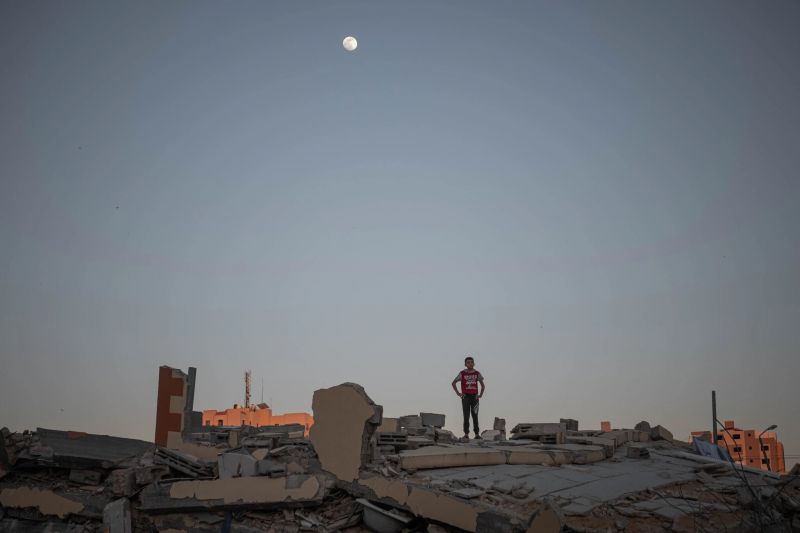
At a news conference recently President Biden made a statement that might have seemed unremarkable: “Let’s get something straight here,” Mr. Biden said. “Until the region says unequivocally, they acknowledge the right of Israel to exist as an independent Jewish state, there will be no peace.”
In those 28 words, Biden described in a nutshell the entire Middle East peace process, past, present and future. With that statement, the president was not setting a condition for a peace agreement or referring to a clause carefully drafted by jurists that includes this acknowledgment of the right of Israel to exist. Instead, he was articulating a principle that is too often overlooked: Achieving peace will require a sincere and genuine internalization by everyone in the region, including the Palestinian national movement, of Israel’s legitimacy as a Jewish state.
The crux of the conflict is two genuine but competing national narratives.
The Jewish narrative is this: Our only national homeland is Eretz Yisrael, the Land of Israel, from which we were forcibly expelled by an empire. It is the place we yearned to return to during two millenniums of dispersion, oppression, persecution and massacre. This yearning is so strong that Jewish couples vow, in their most personal moments, under the wedding canopy, never to forget Jerusalem. When Theodore Herzl, a gigantic leader, converted that yearning into a movement — Zionism — we were able to finally fulfill our dream of returning to Israel.
The Palestinian narrative is as sincere as ours: We have lived in this land, in Falasteen, for centuries, they say. It is ours. The Jewish claim is, at best, folklore, if not a modern fabrication. Zionism is in their eyes a colonialist project. Jews do not belong to Falasteen; Jerusalem is Palestinian.
These two beliefs are the raisons d’être of the respective national movements. Given that a binational state is not a realistic solution to the conflict, partition was and still is the most widely suggested solution: a Jewish state in part of the area, alongside a Palestinian state in another part. Indeed, this has been the proposed solution since 1937, when the Peel Commission offered the Jews a minuscule state, until today. As President Biden noted at that same news conference: “We still need a two-state solution. It is the only answer.”
However, in many instances when concrete partition plans were put forward, the Zionist movement and later the Jewish people accepted compromise and the Palestinians rejected it. When the United Nations approved the Partition Plan in 1947, Jews all over the world celebrated, while Arabs rejected the proposal and started a war to thwart it. The State of Palestine and the State of Israel could have each been celebrating their 73rd Independence Day this year, if the Palestinians had only said yes. They said no.
However, in many instances when concrete partition plans were put forward, the Zionist movement and later the Jewish people accepted compromise and the Palestinians rejected it. When the United Nations approved the Partition Plan in 1947, Jews all over the world celebrated, while Arabs rejected the proposal and started a war to thwart it. The State of Palestine and the State of Israel could have each been celebrating their 73rd Independence Day this year, if the Palestinians had only said yes. They said no.
The reason is simple: History has created a peculiar situation in which two groups — Jews and Palestinians — are Indigenous to the same land. Many Israeli leaders, starting with David Ben-Gurion, recognized that compromise was our only option. But many Palestinians seem to see themselves as having the exclusive right to that land. Hence, they do not want to compromise.
I recall an incident that shows how vehement this view can sometimes be. In an interview with Israel Radio in 2017, United Nations Secretary General António Guterres casually mentioned that it is “completely clear that the Temple that the Romans destroyed in Jerusalem was a Jewish temple.” Shortly thereafter, the Palestinian Minister for Jerusalem Affairs said Mr. Guterres “violated all legal, diplomatic and humanitarian customs and overstepped his role as secretary general … and must issue an apology to the Palestinian people.”
As long as the Palestinians do not acknowledge that they are not the exclusive Indigenous people of the land, they will refuse to compromise, and that is a necessary requisite to achieve peace. Many will continue to prefer conflict to relinquishing parts of what they see as exclusively theirs. Simply recognizing that Israel is strong may be enough for a truce, not for genuine peace. The conventional wisdom in diplomacy is that for peace to be achieved, Israelis and Palestinians should bridge their gaps on each of the so-called “core issues” of the conflict. Those gaps will never be closed until Palestinians understand that justice calls for acknowledging Jewish legitimate rights, and that we Jews belong to our common land. The day Palestinians accept Israel’s right to exist as the legitimate homeland of the Jewish people, a real peace process will begin.
Dani Dayan is the former consul general of Israel in New York.
